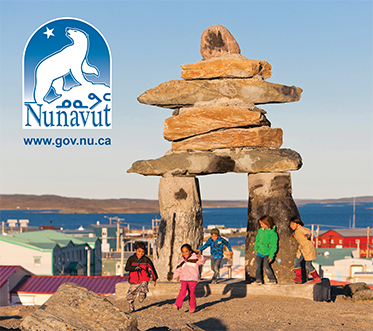Questions for every candidate
Here are some suggestions for talking to the people who want to be your MLA
What election matters are most important to you? Iqaluit musician and lawyer Andrew Morrison shares his top three issues, ahead of the Oct. 27 territorial election. (File photo by Mélanie Ritchot)

Andrew Morrison
As candidates declare their intentions to run in the territorial election in October, voters should look past vague commitments and photo ops.
The campaign is an opportunity to understand how candidates aim to work for change in a territory that has no shortage of opportunities and challenges.
Here are questions Nunavummiut should ask their candidates:
- Air travel – Do you support a public inquiry into air travel in Nunavut?
Air travel is a lifeline in Nunavut, yet Nunavummiut are at the mercy of airlines that set jaw-dropping prices, mysteriously cancel flights, and dictate schedules and policies with little recourse.
Nunavummiut deserve to know what happens behind the curtains of airline operations but have few tools to demand answers. The justice minister can call a public inquiry into matters of public concern. Air travel fits this criterion.
When the Canadian North and First Air merger went through, the competition bureau stipulated an advisory committee be established to ensure transparency and fairness. Where is that committee now? Why are the merger’s terms allowed to be ignored? Ask your candidate if they will support an inquiry and demand airlines finally be held accountable.
- Inuktitut education – What will you do to support it?
One of the reasons for the pursuit of Nunavut was to implement the protection and promotion of Inuit language and culture.
Decades later, Inuktitut education remains a massively under-delivered promise. We all know it, see it and hear it every day among youth in our communities: The presence of Inuktitut continues to fade, steadily displaced by English. What will your candidate do — curriculum, immersion schools, or other programs?
Relatedly, NTI is in the midst of a lawsuit against the GN over delays in implementing Inuit-language rights in schools.
Ask your candidate: Should the GN be fighting Inuit organizations in court over language rights? What is your candidate’s position on this lawsuit? More important — how much has this all cost? Is there a more collaborative approach?
Followups: What roles are Nunavut Arctic College and Nunavut Teacher Education Program playing in training Inuktitut-speaking teachers? Where is the long-promised review/report from the teacher education program? What is the status of implementing the recommendations?
- Contractors – Whose government is it anyway?
The GN’s reliance on southern contractors has become not just a habit but an influential feature of our public service.
This trend not only limits the efficacy of government, it extracts money from the community economies and situates decision- and policy-shaping power among non-Inuit/southern-based interests.
The supposed “need-based” reliance on southern contract workers has been increasingly accepted among the bureaucracy and limits self-determination of residents in the territory.
While this trend continues, the GN will continue to function at a limited capacity and be unable to fulfil its obligations under the Nunavut Agreement.
Ask your candidate: How much does the GN spend on southern contract workers each year? What is their plan to shift these roles into permanent positions for Nunavummiut? How will your candidate work to implement and monitor Inuit employment plans in each GN department?
Andrew Morrison is a lawyer and musician who lives in Iqaluit
Nunatsiaq News invites readers to submit letters to the editor for publication. They must be less than 500 words and signed by the writer. Please send them to editors@nunatsiaq.com.






I think that Mr. Morrison asks some great questions that a future government needs to answer. But here’s the problem:
Let’s say a candidate comes to my door and says the following:
– I am for a public Inquiry into the airline industry in Nunavut. We have to get to the bottom of these outrageous prices!!
– Nunavut is all about Inuit and the Inuit language full stop. We must support this lawsuit ( even though the prior government has fought it tooth and nail). And we must make the investments into curriculum and teachers so that the Inuit language will be taught in our schools and remain a vibrant part of our lives for generations to come!!
– We need to drastically reduce the number of southern contractors to make sure that government money goes to our own businesses and our own people where possible!
All of that sounds fantastic right!! And I go and vote for the individual accordingly. Let’s say that person gets elected for those fine words and then what happens?? I’ll tell you: A big fat nothing. That individual MLA will have a snowball’s chance in hell of getting a public inquiry into our airline. That MLA will also have a snowball’s chance in hell of getting the GN to reverse its fierce opposition to NTI’s lawsuit or to otherwise advance Inuit language education. As for the contracting thing, forget about it.
Instead, the unelected senior bureaucrats will draft the government mandate like they always do, and the disparate group of MLAs will go along with it like sheep as they always do.
Bottom line is that this system of government is not designed to implement the bold change that Mr. Morrison appears to suggest should occur in his letter.
As always, I’ll vote for the person I like. Like I did in high school!!
Are you two friends?
NTI has positioned itself as the defender of Inuktut, yet for the past two years, it has failed to publish books of the winners of its own Inuktuuqta writing award a program meant to celebrate and elevate Inuit voices.
How can we trust institutions to fight for language revitalization in court when they neglect to honour the very writers who keep that language alive?
Meanwhile, voters should be wary of candidates who have helped entrench a system of delay, deflection, and self-interest. George, Solomon, and Simmailak have all played roles in perpetuating dysfunction, whether through policy stagnation or cozying up to power. And let’s be honest: buying votes with restaurant dinners, as George has been seen doing, is not leadership it’s patronage with a side of fries.
We deserve candidates who treat Inuktut not as a political prop but as a living, breathing right. We deserve transparency not just in lawsuits, but in awards, budgets, and backroom deals. And we deserve leaders who earn trust through action, not appetizers.
The values of self sufficiency and self reliance pervade our IQ Principles.
Although all these questions above are superficially fine to ask of our candidates, and certainly on the top of our minds, they do not get to the crux of the matter for our public government; how do we in the 21st century achieve Inuit prosperity and independence?
Whoever we vote in this fall will end up being in charge of a devolved government that will have, for the first time, control over our lands and fresh waters. This is an unprecedented opportunity for Nunavummiut to either spur development using the resources we have, or to slam the door shut to anything other than government spending in our unsustainable communities. Or, put another way, whether we will be in the forefront of critical minerals energy transition, or be still wondering how we can afford our next diesel plant replacement.
How our one main airline acts only matters if the economy of Nunavut can only support a near monopoly on air transport. If our economy grows to support 2-3 major airlines here, there is this wonderful thing called competition that is the best mechanism to meet the needs of air travelers and freight haulers.
The only source of support to promote Inuktitut in Nunavut is what Ottawa gives the GN. If more resources are to be deployed to meet this key societal need, having our MLAs go hat in hand to Ottawa for more money for Inuktitut teachers, train more language specialists, or more Inuktitut publications is not a plan, its a sign of desperation.
What we in Nunavut need to notice is that in places like Alberta, they have invested natural resource revenue partly into their Heritage Fund, and that it has now reached a value of $30Billion that is used “to save for the future, to strengthen or diversify the economy, and to improve the quality of life of Albertans.”
The number of southern workers in Nunavut matters not, until it is compared to a number of local Inuit that are capable, willing and available to replace them. It is assumed that many out of work Inuit could fulfill these roles. This is wrong. A big chunk of the out of work Inuit in Nunavut are not the least oriented to undertake these type of jobs.
Throughout Nunavut’s short history, our leaders and parents have consistently messaged to our youth that it is better that they focus on traditional pursuits that do not pay their bills. Our youth got the message. Pointing at southern contractors asks the wrong question. The real question is when will Nunavut end the bad advice to our youth. The better message is do what you might be good at, without reservation. This will encourage them instead to undertake careers in jobs that would actually allow them to be financially independent.